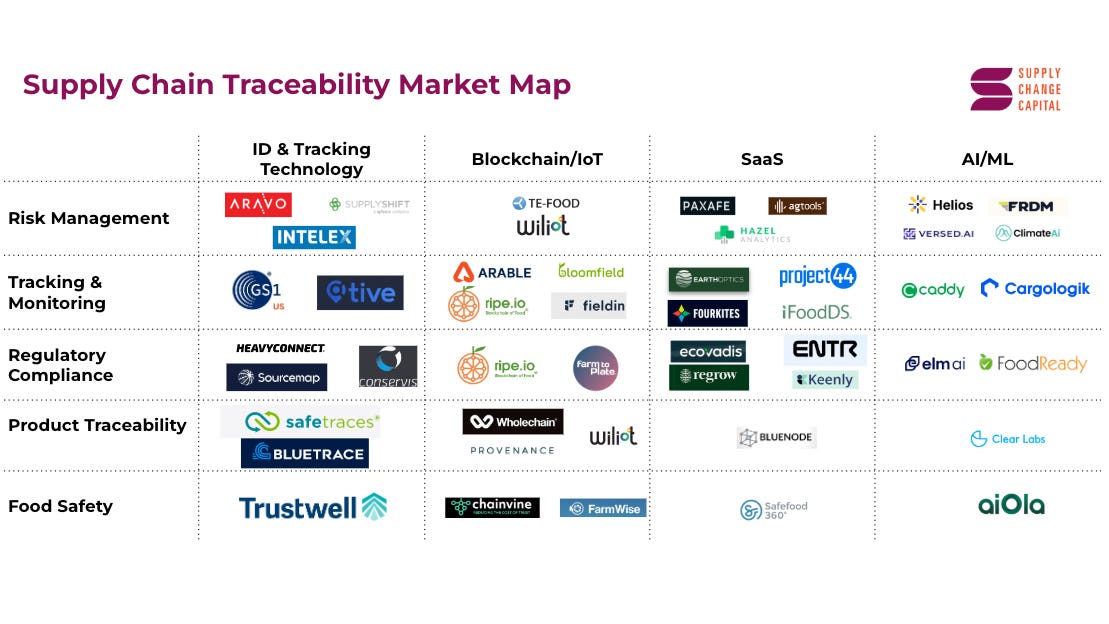AI-Enabled Traceability: The Next Wave of Supply Chain Innovation in Food
Advancements in AI could unlock scalability and affordability for traceability solutions, ushering in a new era for traceability software
The traceability of food value chains has been a point of discussion for decades, and technologies like sensors have long been available to help producers, distributors, and retailers across the food system track and monitor food products.
The next generation of AI-enabled traceability software has the potential to generate transformational change in the food industry by enabling real-time supply chain visibility, enhancing food safety, ensuring regulatory compliance, and strengthening consumer trust through greater transparency. The global food and agriculture traceability market is large and growing at an 8% CAGR, with a projected size of $28.4 billion by 2030.
At Supply Change, we see immense opportunity in this space. There is a plethora of unstructured data ripe for turning into actionable insights at points throughout the food and agriculture value chain, from produce packhouses to grocery retail stores. Since 2023, we have made several investments in companies leveraging AI to put this data to work:
Market Opportunity
The estimated market size of supply chain software was $59 billion in 2024. Traceability software represents ~7% of the broader supply chain software market and is one of the fastest-growing subsectors in the space, with an estimated CAGR of 15.1%.
Sources: FI Consultancy, The Business Research Co.
AI and Industry Tailwinds are Transforming Traceability
Traceability has been a hot topic for years, as food safety incidents, recalls, and environmental concerns have driven demand for greater transparency. However, data collection remained a major bottleneck, preventing businesses from fully leveraging traceability solutions. Traditional systems relied on manual record-keeping, fragmented data sources, and inconsistent tracking methodologies, making end-to-end visibility nearly impossible.
Advances in AI and ML unlock new value creation opportunities for traceability software by enabling:
Automated data extraction from unstructured sources
Real-time analysis and actionable insights
Reduced implementation costs
Enhanced capabilities across risk management, regulatory compliance, and food safety
The food industry has also shifted in favor of traceability in recent years, with increased regulatory pressure, supply chain risk, and growing interest in sourcing from regenerative and/or organic suppliers by food companies looking to meet consumer demand for specific sourcing practices. These three key drivers can accelerate the adoption of AI-enabled supply chain traceability software:
Regulatory Pressure: The Food Safety Modernization Act (FSMA) in the US and the Farm to Fork Strategy in the EU mandate enhanced transparency and traceability across the food supply chain, adding a new depth of compliance for sourcing practices.
Risk Management: Climate events, geopolitical disruptions, and food safety incidents have caused billions in losses. As a result, there is a growing business imperative to reduce these risks with technology.
New Sourcing Initiatives in Food: Growing consumer expectations for ethical sourcing and transparency have pushed food companies to explore sourcing regenerative, organic, and other certified ingredients in their supply chains. Companies like Danone, Cargill, and General Mills, among many others, have committed to source from regenerative sources or support the implementation of millions of acres of regenerative crops in the next 5 years.
With these tailwinds at work and the concurrent rapid advancements in AI, traceability software is no longer a nice to have: it is now a critical requirement for food manufacturers, distributors, and retailers looking to stay competitive.
Competitive Landscape
The competitive landscape for supply chain traceability software remains fragmented with two distinct patterns:
Specialized solutions (typically exit <$50M) focused on specific value chain challenges
Comprehensive platforms (exits >$500M) offering end-to-end solutions
The market is evenly split between early-stage and late-stage companies, reflecting a dynamic market with both emerging startups and established firms driving innovation:
Among the companies that have seen success at the early and later stages, SaaS business models have tended to dominate across a range of product offerings and value propositions:
Paxafe (Series A in 2024, $14.8M raised) has gained traction by offering predictive analytics for supply chain risk management, enabling proactive mitigation of shipment disruptions;
Project44 (Series F in 2022, $818M raised) has excelled through its extensive global carrier network, seamless integrations, and customer-focused logistics optimization;
FourKites (Series D in 2022, $292M raised) has differentiated itself with robust data analytics and strong partnerships, enhancing predictive visibility across transportation modes;
EcoVadis (Acquired for $536M in 2022) has capitalized on the growing importance of sustainability, providing supply chain ratings that help businesses improve their ESG performance.
The primary limitation of existing SaaS solutions lies in their onboarding process for B2B customers, which demands significant time and effort to integrate client data effectively. This bottleneck prevents many companies from realizing the full potential of these platforms. AI, however, can be one solution to overcoming these challenges by automating and streamlining data ingestion, analysis, and decision-making.
Key Investment Opportunities
Attractive investment opportunities for AI-driven traceability will emerge in food processing and distribution. These segments face substantial financial and reputational risks from recalls and cold chain failures, making traceability essential. Regulatory mandates and consumer demand for transparency — heightened by crises like Avian flu — will accelerate adoption. As crucial intermediaries, these companies can improve visibility across the entire supply chain. With larger budgets and acute risk mitigation needs, they are primed to adopt AI-powered traceability solutions that deliver clear value with reduced costs or risk.
The most compelling solutions to meet this need are:
Upstream tracking and monitoring solutions. Companies like Caddy and iFoodDS are emerging as food and agriculture-specific solutions. There is white space for a traceability software company that leverages AI/ML to optimize tracking and monitoring in the processing and/or distribution segments of the value chain.
Risk management software. Companies including Paxafe and Helios AI* exemplify how AI/ML can enhance supply chain risk management through predictive analytics, real-time anomaly detection, and automated compliance monitoring.
Food safety platforms providing proactive contamination detection and automated compliance. Aiola and FoodReady* exemplify how AI can transform food safety by providing predictive insights and automating risk assessment. Despite these advancements, much of the food industry still relies on outdated, reactive safety measures. A purpose-built AI/ML platform focused on proactive food safety solutions in processing and distribution that leverages real-time data, predictive analytics, and automated compliance presents a major opportunity for venture-backed innovation.
*Note: FoodReady and Helios AI are Supply Change Capital portfolio companies.
Conclusion
AI will drive the next wave of innovation in supply chain traceability. The most successful ventures will target underserviced segments like food processing and build comprehensive solution suites that deliver clear ROI through reduced compliance costs, minimized waste, and improved operational efficiency.
As we continue to evaluate the sector, we are most excited about companies that:
Leverage AI/ML for tracking, monitoring, and predictive analytics to enhance food safety and supply chain resilience.
Target processing and distribution, where traceability failures pose the most financial and reputational risk.
Offer interoperable solutions that integrate seamlessly with existing supply chain systems, overcoming data fragmentation challenges.
Deliver clear ROI by reducing compliance costs, minimizing waste, and improving operational efficiency.
If you’re building AI-powered traceability, compliance automation, or supply chain intelligence, share your opportunity here. We’d love to hear from you!








